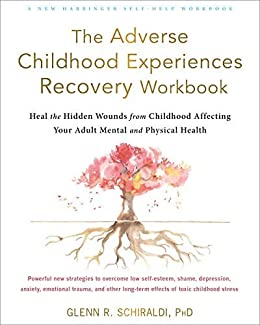“Dr. Glenn Schiraldi is one of the world’s most trusted experts on stress and resilience. His Adverse Childhood Experiences Recovery Workbook is the most complete, accessible, and evidence-based healing resource available. The ripples of childhood trauma spread throughout our society affecting every facet of life. Thanks to Schiraldi’s stellar work, there is a now a trusted map to recovery available for lay people and helping professionals alike. This workbook is a game changer with the power to heal lives. I can’t recommend it highly enough.”
— Joan Borysenko, PhD, distinguished pioneer in integrative medicine. New York Times best selling author of Minding the Body, Mending the Mind
Abundant research over the last two decades clearly shows that adverse childhood experiences (ACEs) put adults at much greater risk for many, many psychological and medical conditions. ACEs include all types of abuse and neglect; living in a home where there is a missing parent or someone who is mentally ill, suicidal, violent, or addicted to drugs; and other forms of childhood upheaval. ACEs lead to conditions ranging from depression, anxiety, PTSD, ADHD, suicidality, and drug abuse to autoimmune disorders, obesity, diabetes, chronic pain, and even cancer and heart disease. ACEs may well be called the number one unaddressed public health problem because of the suffering they cause. Many people suffer needlessly for decades, perhaps not understanding the root cause of their suffering, nor the healing options. Now there is a practical, powerful guide to heal the hidden wounds caused by ACEs. I’d like to explain how this workbook came to be and tell you a little about its contents.
As a military veteran who specialized in stress, trauma, and resilience at the University of Maryland’s School of Public Health for decades, I’ve observed that adults who appear outwardly normal often carry painful hidden wounds from their earlier years. Knowing that emotional suffering predicts a range of medical illnesses, I developed and tested skills-based courses to reduce such suffering—while also optimizing health and performance. We found that this training reduced symptoms of anxiety, depression, and anger, while increasing resilience, happiness, self-esteem, optimism, and curiosity. In the meantime, I developed a resilience training program for high-risk groups such as cops, firefighters, and the military to prepare them emotionally for the difficult challenges they face. These groups are typically well trained tactically, but not emotionally, and usually have experienced more ACEs than their civilian peers.
During this time, Dr. Vincent Felitti tested the notion that the effects of ACEs accumulate and set people up for enormous suffering in adulthood. Both his and subsequent research have firmly established that ACEs predict myriad disorders that doctors and mental health professionals so commonly treat today. However, as Dr. Felitti has observed, too often we treat the smoke (the symptoms) without treating the cause (the hidden wounds from ACEs).
People often ask, “Am I stuck with this suffering? Is there anything that can help me feel normal? What can I do to heal? How do I find the right help?” I came to realize that there was a dire need for a clear guide to help people heal those hidden wounds from the early years. People need to know that they do not have to suffer for decades. There are many effective healing and coping skills to try. The Adverse Childhood Experiences Recovery Workbook explains a wide variety of very effective, practical skills. These skills are based on recent findings in neuroscience, attachment, traumatic stress, and resilience—put together under one cover. Recent advances in understanding the brain’s response to traumatic stress indicate that traditional psychological approaches that emphasize thinking and talking are usually not the best starting point for healing. Instead, this workbook first utilizes body-centered and attachment-based imagery strategies before talking/thinking strategies are tried. And when additional help is needed, the workbook shows how to find the right professional help.
What can you expect? Practicing the principles and skills in this workbook is likely to greatly reduce your suffering, improve happiness, and help you improve your mental and physical health and functioning generally. If you are a helping professional, this workbook will give you many powerful tools to help your clients heal.
For more details about the book, click here or purchase the book by clicking here


Recent Comments